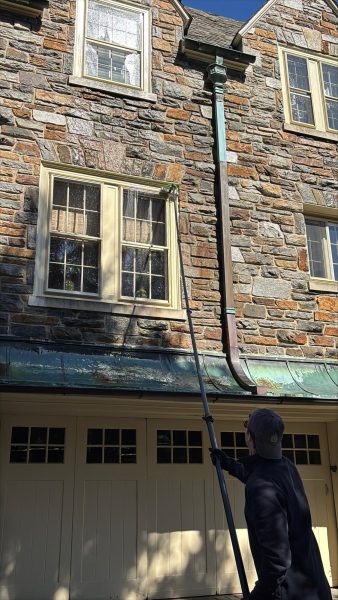The Price of Açaí: How a Smoothie Bowl is Made from One of the Most Dangerous Jobs in the World

This article is intended to inform, not persuade.
Anna Young ‘23 said that she was on LinkedIn, of all places, when she realized that Loyola may be selling a product that was produced by child labor. Someone that Young followed posted a U.S. Department of Labor study that listed products that were made by child labor or forced labor, one of them being açaí. As a global studies major and international business minor, this was something that caught her attention.
“It took me about 20 minutes and I was able to find an article about how Loyola’s açaí berries were from Sambazon,” Young said.
Sambazon is an American company that produces and sells açaí berry-based goods. The product that started Sambazon, and that is enjoyed at Loyola’s Green Peel here on campus, is the açaí bowl. Thick and creamy, with a dark purple color, açaí bowls are the final product of what researchers have claimed to be one of the most dangerous jobs in the world.
The açaí berry, rich in anthocyanin, an antioxidant that has been marketed to lower stress and inflammation and even improve memory, is found in the Amazonian region of South America, most notably in Pará, Brazil. In Pará alone, there were around 188,000 acres of açaí plants, and the number only continues to rise with the high demand for açaí. While Sambazon announced the opening of its second production factory in Pará in 2019, that same year an article titled, “Do you prefer your açaí with granola, banana or child labor?” was written about a 13-year-old boy named Alessandro from Pará who scaled 80-foot-high açaí palm trees in over 95-degree heat to provide for his family.
Lindsay Winn, the General Manager of Loyola Dining said that over the summer of 2021, the supply chain team for Parkhurst, the dining organization that is contracted by Loyola, met with Sambazon. Winn said that Sambazon shared their certifications and their sustainable business philosophies with Parkhurst and went over their efforts to regulate their supply chain.
“We purchase a good amount of açaí, it’s very popular on campus, so we worked with our supply chain to touch base about that vendor, get more sourcing information, so some of it was just learning more about the partnership with them. We source them through a distributor, we don’t buy directly from Sambazon,” Winn said.
Although açaí has been harvested and used as a staple food in South America for hundreds of years, the new health kick was only recently brought to the U.S. In Sambazon’s case, founder Ryan Black went into detail about how he tasted his first açaí bowl on a vacation to Brazil. In an interview with Forbes, Black noted the rise of açaí popularity in the U.S., and in 2004 Sambazon started selling its products in Whole Foods Markets and other organic food retailers.
However, in 2021, his company was accused of misleading information on their child labor and Fair-Trade commitment by The Washington Post. It was this Washington Post article that made Young realize eating açaí bowls was not worth it for her.
“If you look at the cost that it takes to make an açaí bowl compared to the 20 minutes you’re eating it, is it worth it? Personally, I don’t think so, and I think that other students as a whole should be informed of where our meals are coming from and where our produce is coming from,” Young said.
The Post’s article went into detail about the life of açaí farmers, called peconherios, who are usually children, because of the palm tree’s inability to hold heavy weight. The farmers often use a loop made of leaves or burlap to slide their feet up and down the palm tree, usually barefoot and equipped with a machete. Some of the physical risks include falling from trees, getting impaled by their machetes, heat-induced ailments, and stings or bites from insects or venomous snakes.
The article also included interviews with four past Sambazon employees who stated that there were gaps in the company’s ability to control the production chain, and two açaí merchants in Brazil who claimed that Sambazon bought fruit outside of its registered network, selling to Sambazon supply ships without questions of the ethicality of how it was harvested. Both Black, the founder, and a former Sambazon employee denied the claims.
Despite these claims against Sambazon, the company does enforce a pro-sustainability and Fair Trade stance. Underneath the different ways to purchase Sambazon products on their homepage is Sambazon’s description of what it means to be a Fair Trade and sustainable company. A Fair Trade label is something that identifies a company for meeting certain internationally held standards that have been verified through independent certifiers, to safeguard farming families and their working rights.
In the same Washington Post article, Charity Ryerson, an executive director of a Corporate Accountability Lab, said that “This is one of those situations where certifications shouldn’t be allowed.”
The article also mentioned that while working in the fields, it is not hard to call out and say that an auditor is coming to alert children to come down from the trees. The Childhood and Child Labor in Açaí Extraction in the Brazilian Amazon study from 2019 stated that, according to a survey of 1,029 families working in açaí production, 89% of respondents knew someone in their family that had been hurt while working, one out of every two injuries requiring hospitalization. The study also included a statistic from 2016 by the Instituto Peabiru, which supports Eastern Amazonian family and agricultural rights, saying that work relationships in Brazil were 100% informal, without any external monitoring. João Meirelles, the director of this NGO said that “Without a doubt, we need to urgently address the question of child labor in açaí.”
Sambazon’s main message of a “Triple Bottom Line,” means Sambazon focuses not only on their economic success, but the success of their workers and their surrounding environment. They are proud of their efforts to give back to the Amazonian community, stating that their employees, including factory workers in Brazil, have set wages and safe working conditions, with zero tolerance for harassment of exploitative practices. They also take pride in having created their own supply chain, working with NGOs to certify thousands of families that harvest and sell their own product, without having to use risky middlemen.
In a United Nations Global Compact document from 2011, Sambazon claims that their commitment to human rights and sustainability was outlined along with evidence to prove these claims. In this document, evidence of educational institutions set to help the communities of Sambazon employed families and the creation of a more sustainable energy source using the pits of açaí were found. Sambazon’s educational programs involved not-for-profit child care as well as donations of televisions, stoves, telephones, and computers. Financial literacy training was also provided.
However, in this same document, Sambazon acknowledged the fact that harvesting açaí and managing the palm trees they grow in is a high-risk activity that could result in accidents at work. They claimed to implement informational safety sessions with harvesters and, in response to the dangerous activity of picking the berries, Sambazon provided farmers with better covers for their machetes and baskets that were better equipped at storing açaí so that the berries stay fresh for longer. There was no mention of efforts to stop child labor.
In the last section, anti-corruption, Sambazon stated that it had strict control of the purchases of açaí fruits because of its Fair-Trade certification. When asked to provide evidence of how the company monitored anti-corruption in the supply chain, no answer was provided.
When asked how often agriculture is unethically harvested, Dr. Maren Blohm, Associate Professor of Biology and a member of the Sustainability Committee here at Loyola, responded with a straightforward, “Often.” Dr. Blohm said that easily more than 50 percent of agriculture is harvested with the unethical treatment of workers.
“Most companies, in my personal experience, turn a blind eye as to how production practices are, unless they’re pressed on it,” Blohm said.
Blohm believes in focusing on the bottom line of all the individuals that work in production, along with the surrounding environment, resembling Black’s mission statement. However, she also knows that shipping açaí is not such a sustainable task. Berries have a short shelf life and can only be transported frozen or powdered, and to keep these berries frozen at an exact temperature so that they stay fresh while shipping them to other countries is a very unsustainable undertaking.
Using quinoa, which is also grown in South America, as an example, Blohm described another ethical debate regarding outsourcing health food trends to the U.S.
Blohm said, “There is a product that could act as a staple food for the people who live in that area, but now that production is being pushed to the U.S. There are a lot of issues, if we as the U.S. get really into something, we are actually taking physical nutrition resources away from the country that they’re being grown in. Are we putting resources where they actually should be?”
In a video from 2021, a news reporter visited the home of a family of açaí berry harvesters in the Amazon. The grandmother often did not know what food she would eat for the day, serving her children and grandchildren bowls of porridge on the floor before going out to pick the critically acclaimed superfood.
Weber DuVal ‘23, Vice President of the Environmental Action Club and Director of Sustainability was approached by Young and others about Loyola’s connection with Sambazon and unethically harvested açaí. For DuVal, it is important to bring attention to this topic, especially to the students of Loyola.
“I am hoping that more than anything students will begin to change their actions once this information gets out,” DuVal said.
He acknowledged that on a larger scale, if the University sees that the popularity of açaí bowls is going down, he hopes that they will get rid of their contract with Sambazon.
Young agrees with the sentiment about students hopefully being more conscious but has also heard other sides of the argument. For example, some may say that so many other products we use daily are produced unethically and one açaí bowl won’t particularly matter.
Young said, “It doesn’t have to be that black and white, the reason that I brought up that açaí bowls and child labor is a problem is because I think that it’s such an easy thing to substitute. It’s one little thing you can take out of your day and be conscious enough to be like, ‘Wow if this is produced by child labor maybe I’ll just have a locally grown egg.’” Young added that it doesn’t have to be all or nothing.
“It can be a gradual change to your daily routine or habits to try to reduce how many children are forced into labor,” Young said.
Winn said that Loyola and Parkhurst Dining are always willing to evaluate what vendors and partners they have on campus.
To submit feedback or get in contact with Loyola Dining you can send an email, submit a direct message on their Instagram, or utilize virtual comment cards that are linked to their website.
Featured Image Courtesy of Johnny Cozza.











































































































